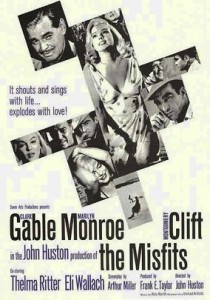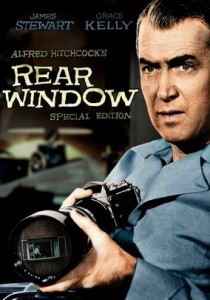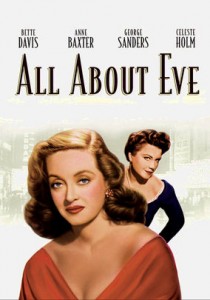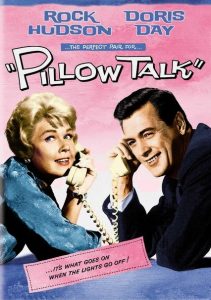The Misfits-1961
Director John Huston
Starring Marilyn Monroe, Clark Gable, Montgomery Clift
Scott’s Review #389

Reviewed March 27, 2016
Grade: B+
A dark film about loneliness, insecurity, and the need for friendship, The Misfits (1961) stars several of the era’s great legends in a film that I found both sad and disturbing.
Tragically, two stars would soon be gone from this world shortly after the film was made- Clark Gable and Marilyn Monroe. This was the final film for each.
The film, shot in black and white, has a bleak feel and represents the onset of darker decades in the film (the 1960s and 1970s). Primarily starring in light, feel-good films, The Misfits is a complete departure for Monroe.
The film is well-written and character-driven, which appeals to me, but cruelty to animals is a lot to take.
Set in Reno, Nevada, Roslyn has arrived from out of town for a quickie divorce. She is staying with Isabelle (Thelma Ritter), who frequently assists women needing divorces, lending as their witness in court.
After the divorce is final, they go to a local watering hole to celebrate life, where they meet an aging cowboy, Gay (Gable), and his tow-truck friend, Guido. They all agree to go to Guido’s house in the desert to party. When they arrive, they learn that Guido’s wife has recently died.
From this point, Gay and Roslyn become a couple and grow vegetables at Guido’s house, attempting to begin an everyday life. Later, the group decides to round up Mustangs and hire a rodeo hand, Perce (Montgomery Clift), to help.
This leads to conflict as Gay intends to sell the horses as dog food. A subplot of a love triangle between Gay, Roslyn, and Perce emerges.
The Misfits is a rugged watch. From a story perspective, it is cynical and sometimes heartbreaking. Each of the principal characters is severely damaged and pained.
We learn that Gay has two estranged children. When he runs into them at a bar, he excitedly wants to introduce them to Roslyn, but they have left before he can.
In a drunken stupor (and a sad scene), he pathetically calls out for them to return, causing a stir. Perce’s father has died, and his mother left a changed woman- his stepfather selfishly takes their ranch for himself, despite Perce’s father wanting it to go to Perce.
Alcohol abuse is prevalent throughout the film- obviously, the characters drown their sorrows to escape or avoid the pain that they feel.
The opening credits are unique and feature puzzle pieces. This symbolizes the group’s isolation and desire to find each other and fit in. They are all misfits who come together for some sense of companionship.
This is a unique aspect of the film, and director John Huston deserves the credit for immediately setting the tone for clever viewers.
The acting in The Misfits is outstanding, and I would argue that Monroe and Gable’s performances are the best in their respective careers. They both chartered very dark territory in the lonely and damaged characters they portrayed.
Thelma Ritter adds sardonic humor but inexplicably vanishes from the film about halfway through- never to return or be mentioned again.
I would have liked to have seen much more of Isabelle and more depth to her character. Why was she a misfit? She mentions loving all cowboys, so we might assume she has had her share of damaged relationships with men. More clarity might have been interesting.
The final portion is difficult to match. Ann’s interminable scene involves Gay and Perce savagely rounding up the horses and roping them down overnight—the length of the scene and the the horses’s struggles to escape will tug at one’s heartstrings.
Knowing that animals, until quite recently, were not treated well on film sets leaves me twice as unsettled.
Dark stuff.
A film fraught with difficulties (Monroe and writer Arthur Miller’s marriage breakup, Monroe’s and Huston’s substance abuse issues), and a dark subject matter, make The Misfits an intriguing experience.
Having watched the film twice, I appreciate it more with each viewing and think it contains memorable qualities worth exploring.
As the years have passed, The Misfits (1961) has become more appreciated, like a fine wine- I am realizing why.



